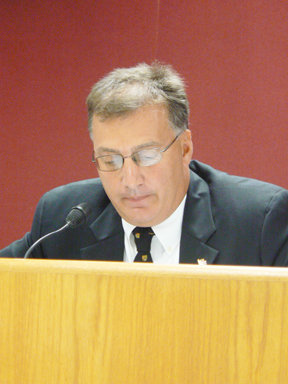After weeks of waiting approval from the state, the Town Council can finally pass the 2010 municipal budget – a spending plan that was kept in limbo because of delays in Trenton.
The council has scheduled a special session for Tuesday, Aug. 31 at 7 p.m. for this vote.
For two months in a row, the Town Council wasn’t able to vote on the 2010 municipal budget because the state Local Finance Board didn’t vote on a provision in the budget that needed their approval.
When the town’s $45.5 million budget was introduced in June, there were two provisions that required state approval. The Local Finance Board needed to approve the town’s plan to restructure $3.2 million worth of debt from the Secaucus Municipal Utilities Authority (SMUA) and, also, sign off on floating bonds to pay for tax appeals.
Mayor Gonnelli said the council was able to reduce the size of the budget by another $250,000, thus reducing the size of the tax increase.
________
The seven-member Local Finance Board approved the bond issue in July, but didn’t vote on the SMUA bond issue until Thursday, Aug. 26, two days after the council met.
The added delay means the council won’t consider the municipal budget until Tuesday, a fact that frustrated Mayor Michael Gonnelli last week.
“It is frustrating because this budget has been ready for weeks. And now we’re going to pass it late, due to no fault of our own,” he said.
And Secaucus isn’t alone. Financial issues in at least 33 other municipalities are in limbo, including Jersey City, until the Local Finance Board takes action.
In Secaucus, quarterly property tax bills were mailed on Aug. 6, according to the mayor. Taxpayers received estimated tax bills since there is no finalized 2010 budget, even though eight months of the fiscal year have passed. (Secaucus uses the calendar year as its fiscal year.)
Commenting on the delay in Trenton, a business administrator in another municipality (who did not want to be identified by name) said, “The delay doesn’t really hurt taxpayers or the municipality,” he said. “It’s not like taxpayers will have to pay more money or the town will lose money because of the delay. But it is an example of the bureaucratic process in Trenton.”
Outstanding payments could offset tax increase
As reported last month, the council has used the delay in Trenton to make further cuts to the budget.
The original $45.5 million budget introduced in June included a 66-cent tax increase for every $1,000 of property owned. Since the town assesses the average Secaucus home at $165,000, the 66-cent increase would have meant the average homeowner would pay about $108 more per year to support the municipal budget, which amounts to $27 per tax quarter. (This 66-cent increase is for the town’s tax rate only, and is separate from the county and school taxes property owners also pay each quarter.)
However, Mayor Gonnelli confirmed last week that the council was able to reduce the size of the budget by $250,000, and thus reduce the size of the tax increase. The proposed tax increase will be 55 cents for every $1,000 of property owned – a 10-cent drop from the original proposed amount.
The smaller tax increase was possible because the town is aggressively pursuing payment of old fines and fees owed by businesses and other property owners.
Councilman Gary Jeffas noted that $235,348 has been collected from businesses that owed false alarm fines. The town is currently in court trying to collect on another $119,460 in false alarm fines.
Similarly, the town is now collecting on $589,799 in special assessments that were never reimbursed for road repair work done in 2006 and 2007.
Former Mayor Richard Steffens, however, warned the council on Tuesday that, given the new state-mandated cap on municipal tax increases, it “might make more sense” to keep the 66-cent tax increase and use the $250,000 in savings as a cushion in next year’s budget.
On Thursday, Gonnelli said Steffens is right, “but I think we owe it to residents to get the tax increase down a little bit more.”
E-mail E. Assata Wright at awright@hudsonreporter.com.
